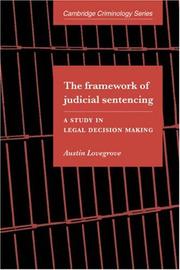| Listing 1 - 4 of 4 |
Sort by
|
Book
ISBN: 0198256523 9780198256526 Year: 1990 Publisher: Oxford: Clarendon,
Abstract | Keywords | Export | Availability | Bookmark
 Loading...
Loading...Choose an application
- Reference Manager
- EndNote
- RefWorks (Direct export to RefWorks)
Administrative discretion --- Judicial discretion --- Pouvoir discrétionnaire (Administration) --- Pouvoir discrétionnaire des juges --- 35.076 <41> --- Rechten en plichten van overheidsorganen.--Verenigd Koninkrijk van Groot-Brittannië en Noord-Ierland --- 35.076 <41> Rechten en plichten van overheidsorganen.--Verenigd Koninkrijk van Groot-Brittannië en Noord-Ierland --- Pouvoir discrétionnaire (Administration) --- Pouvoir discrétionnaire des juges --- Administrative discretion - Great Britain --- Judicial discretion - Great Britain
Book
ISBN: 0198254989 9780198254980 Year: 1986 Publisher: Oxford : Clarendon press,
Abstract | Keywords | Export | Availability | Bookmark
 Loading...
Loading...Choose an application
- Reference Manager
- EndNote
- RefWorks (Direct export to RefWorks)
Public law. Constitutional law --- Great Britain --- Administratieve discretie --- Administrative discretion --- Appréciation souveraine des juges du fond --- Arbitraire judiciaire --- Discretion (Law) --- Discretion [Judicial ] --- Discretion administrative --- Discretion of court --- Discrétion juridique --- Intime conviction --- Judicial discretion --- Juges--Pouvoir discrétionnaire --- Juridische beoordeling --- Pouvoir d'appréciation des juges --- Pouvoir discrétionnaire des juges --- Souveraineté des juges du fond --- -Judicial discretion --- -35.076 <41> --- Discretion, Administrative --- Administrative law --- Dispensations (Law) --- Rule of law --- Discretion, Judicial --- Judges --- Law --- Rechten en plichten van overheidsorganen.--Verenigd Koninkrijk van Groot-Brittannië en Noord-Ierland --- Law and legislation --- Interpretation and construction --- Administrative discretion. --- Judicial discretion. --- 35.076 <41> Rechten en plichten van overheidsorganen.--Verenigd Koninkrijk van Groot-Brittannië en Noord-Ierland --- 35.076 <41> --- Administrative discretion - Great Britain. --- Judicial discretion - Great Britain. --- Administrative discretion - Great Britain --- Judicial discretion - Great Britain

ISBN: 9780521584272 9780511520969 9780521032568 0521032563 0521584272 0511520964 Year: 1997 Publisher: Cambridge : Cambridge university press,
Abstract | Keywords | Export | Availability | Bookmark
 Loading...
Loading...Choose an application
- Reference Manager
- EndNote
- RefWorks (Direct export to RefWorks)
Austin Lovegrove examines the sentencing of offenders appearing on multiple offences and how judges, having fixed a prison sentence for each offence, determine an overall sentence for each offender. Analysing judges' verbal protocols for sentencing problems and sentences for fictitious cases, he is able to offer, first, a model of judicial sentencing in the form of a decision strategy comprising working rules deduced from the given responses of judges as they attempted to apply sentencing law, and, second, a numerical guideline in the form of an algebraic model quantifying the application of the working rules. On the basis of this empirical data, Dr Lovegrove furthers understanding of the nature and place of intuition in sentencing and of how the cumulation of sentence can be integrated into a system of proportionality related to the seriousness of single offences.
Criminal law. Criminal procedure --- Legal theory and methods. Philosophy of law --- Great Britain --- Sentences (Criminal procedure) --- Judicial discretion --- Decision making --- Decision making. --- Sentencing --- Discretion, Judicial --- Discretion (Law) --- Discretion of court --- Correctional law --- Criminal procedure --- Judgments, Criminal --- Punishment --- Administrative discretion --- Judges --- Law --- Interpretation and construction --- Social Sciences --- Sociology --- Sentences (Criminal procedure) - Great Britain - Decision making --- Judicial discretion - Great Britain --- SENTENCING --- GREAT BRITAIN --- DECISION MAKING --- JUDICIAL DISCRETION --- SENTENCES --- CRIMINAL PROCEDURE
Book
ISBN: 3642320112 3642437931 3642320120 1299197620 Year: 2013 Publisher: Berlin ; New York : Springer,
Abstract | Keywords | Export | Availability | Bookmark
 Loading...
Loading...Choose an application
- Reference Manager
- EndNote
- RefWorks (Direct export to RefWorks)
The protection of fundamental rights in the field of transnational criminal inquiries is of great delicateness in the current tangled web of domestic and international legal sources. Due to this complex scenario, this research has been carried out from a four-level perspective. The first level provides a critical analysis of the multilevel systems of protecting fundamental rights from the perspective of supranational and constitutional case law, and in the field of international and organized crime. The second level focuses on EU judicial cooperation in three main fields: financial and serious organized crime, mutual recognition tools, and individual rights protection. The third level provides the perspectives of ten domestic legal systems in two fields, i.e., obtaining evidence abroad and cooperation with international criminal tribunals. The fourth level analyses cross-border inquiries in comparative law, providing a reconstruction of different models of obtaining evidence overseas.
Criminal procedure -- Great Britain. --- Evidence (Law). --- Judicial discretion -- Great Britain. --- Procedure (Law) -- Great Britain. --- Law, Politics & Government --- Human Rights --- Human rights. --- International law. --- Law of nations --- Nations, Law of --- Public international law --- Basic rights --- Civil rights (International law) --- Human rights --- Rights, Human --- Rights of man --- Law and legislation --- Law. --- Private international law. --- Conflict of laws. --- Comparative law. --- International criminal law. --- International Criminal Law. --- Private International Law, International & Foreign Law, Comparative Law. --- European Law. --- Human Rights. --- Law --- Human security --- Transitional justice --- Truth commissions --- International Criminal Law . --- Private International Law, International & Foreign Law, Comparative Law . --- Law—Europe. --- Choice of law --- Conflict of laws --- Intermunicipal law --- International law, Private --- International private law --- Private international law --- Legal polycentricity --- Criminal law, International --- ICL (International criminal law) --- Criminal law --- International law --- Criminal jurisdiction --- International crimes --- Civil law
| Listing 1 - 4 of 4 |
Sort by
|

 Search
Search Feedback
Feedback About UniCat
About UniCat  Help
Help News
News